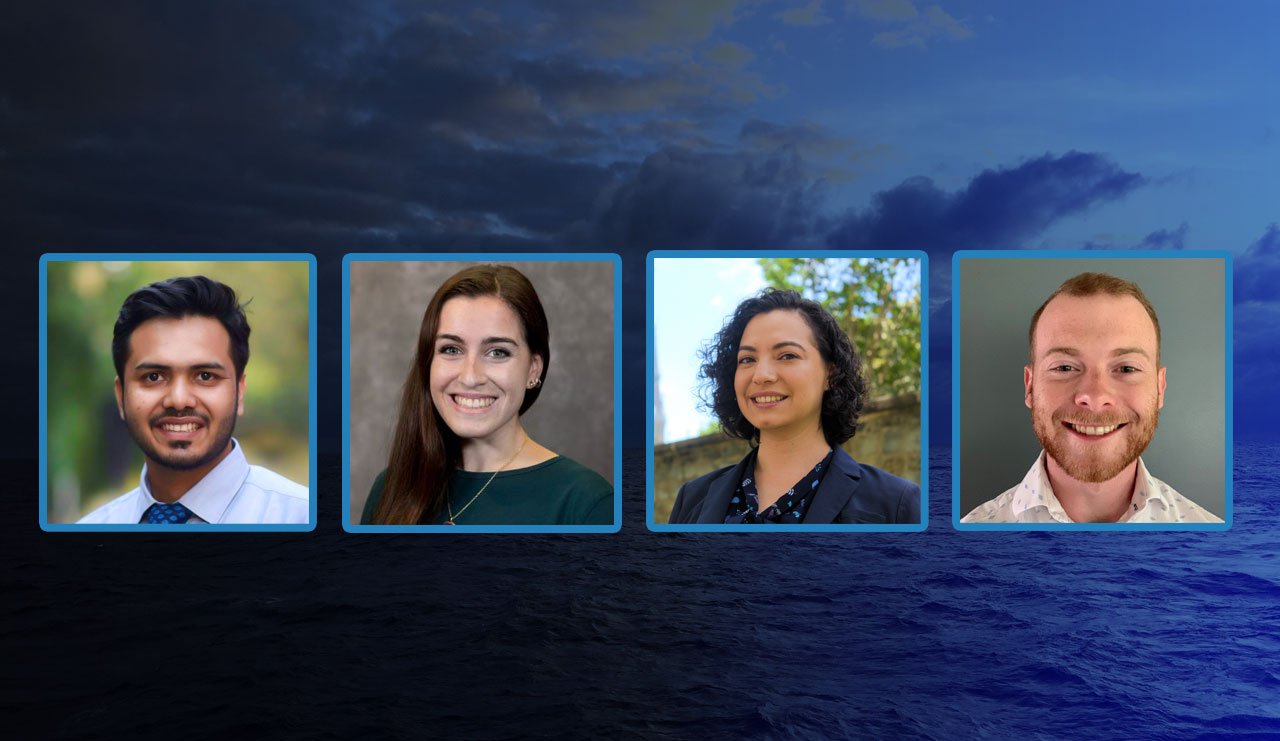Delaware Sea Grant announces 2023 Knauss Finalists
Four students nominated by Delaware Sea Grant (DESG) have been selected as finalists for the 2023 John A. Knauss Marine Policy Fellowship Program
Those students include two from the University of Delaware, one from Georgetown University and one who is a recent graduate from American University. DESG rotates with the Maryland and Virginia Sea Grant programs to process applications that come from Washington, D.C.
Sponsored by the National Sea Grant College Program and the National Oceanic and Atmospheric Administration (NOAA), the Knauss Fellowship provides a one-of-a-kind educational experience for students interested in the national policy decisions that affect ocean, coastal and lake resources.
Joanna York, director of DESG, said that this year had a competitive and well qualified pool of applicants for the Knauss Fellowship.
“The applicants who were chosen will bring considerable experience and strengths to the Knauss program,” said York. “We are incredibly excited for them and look forward to hearing more about their accomplishments in the next year.”
Joy Deep Chakrabartty
An international student from Bangladesh with a bachelor’s degree in urban planning and a master’s in environmental economics, Chakrabartty is a Ph.D. candidate in UD’s School of Marine Science and Policy working with George Parsons, the Unidel E.I. du Pont Professor of Marine Studies. His research concerns environmental policy and resource valuation.
Chakrabartty said that his passion for the environment stemmed from his experience growing up in Dhaka City, the capital of Bangladesh, which experiences high levels of pollution.
“I realized through my research and job experience that it is important to measure the value of environmental resources and the cost society bears as a result of environmental degradation,” said Chakrabartty. “Many policies that have detrimental effects on the environment would not be adopted if these valuations were incorporated accurately.”
As his ultimate goal is to contribute at a policy level, Chakrabartty is looking forward to the Knauss Fellowship.
“It is a great opportunity for me to be a part of a real-world policymaking process. I wish to learn from seasoned policy makers and practice and apply policy tools I learned in my academic life,” said Chakrabarrty. “The last few centuries of Earth are the history of human triumph and development. But this is only one side of the coin. If we flip the coin we will see a story of egocentric natural resource consumption, incessant environmental pollution, destruction of ecological balance and abysmal discrimination in wealth distribution. Though economic growth is inevitable, it should not take place at the expense of environmental sustainability. I believe it is possible to find a better combination of growth and environment that generates more prosperity and less emission.”
Thalia Eigen
Eigen is thrilled to be named a Knauss finalist and said she couldn’t think of a better opportunity, as she is interested in working for the federal government and wants to gain experience in marine policy.
A recent graduate from American University with her master's in environmental science, Eigen said that during her time at American, she researched groundwater seep ecosystems in the Washington, D.C. region and the organisms that have adapted to life in constant darkness to live within them.
“I grew up in the Washington D.C. area and have always loved studying the ecology of my home,” said Eigen. “My project allowed me to keep my scope local and examine lesser-known ecosystems in a place I know very well, while also examining how residents like myself impact these ecosystems.”
As someone who enjoys being out the field—especially hiking through the woods to collect data—Eigen said she couldn’t think of a better career than one in marine science.
“I have always had an interest in marine and coastal ecology and policy from spending a lot of time on Maryland's Eastern Shore growing up,” said Eigen. “As my academic and professional experiences have mostly been relevant to environmental education and terrestrial ecology, the Knauss Fellowship seemed like a great way to use the skills I had gained so that I could transition toward a career relevant to some of my other interests.”
Jewel Tomasula
Tomasula studies salt marsh ecology and clonal plant genetic diversity as a Biology Ph.D. candidate at Georgetown University. She has been a leader in the Georgetown Alliance of Graduate Employees labor union, which has given her hands-on experience with policymaking and democratic processes.
For her doctoral research, she has worked in the salt marshes of the Great Bay estuary in New Jersey. Tomasula said she got interested in her area of study because she wanted to learn more about genetic diversity within specific species. Tomasula said she loves fieldwork and setting up experiments, especially those that involve collecting plants and arthropods.
“I get attached to my study sites, and I like learning about all the different species in them,” said Tomasula. “Genetic diversity within a species isn’t usually monitored or considered during ecological restoration, which is something I learned while working in environmental science jobs before I started grad school. Through my research, I wanted to help figure out how plant genetic diversity contributes to ecological resilience and add to the evidence base that informs restoration. Genetic diversity questions are especially important in coastal ecosystems like salt marshes that are naturally low in plant species diversity but likely high in genetic diversity within those few dominant plant species.”
With regards to the Knauss Fellowship, Tomasula said she was drawn to apply because her goal is to work in public service and policymaking after grad school.
“As a Knauss Fellow, I hope to contribute to writing environmental policy and to find my next step in this career path,” said Tomasula.
Grant Voirol
Voirol is completing his master’s degree at UD where he studies Adélie and Gentoo penguin movement and foraging ecology with Matt Oliver, the Patricia and Charles Robertson Distinguished Professor of Marine Science and Policy.
Having always been interested in animal behavior, Voirol said that with movement ecology, he gets to work with a lot of interesting tagging and tracking technologies, which helps him to understand penguins a little bit better.
“Getting into the headspace of a penguin and imagining yourself swimming along the tracks is always fun,” said Voirol.
Voirol said he feels lucky and is excited to start the fellowship, especially the chance to live in a city like Washington, D.C. He added he is looking forward to “understanding how environmental policy works and building my professional network.”
Update: Jack Polentes
Polentes is a second year Masters student studying environmental metrology and environmental policy at Georgetown University. With a background in geosciences, as well as minors in chemistry, biology, and environmental sciences from Hobart & William Smith Colleges, Polentes said he has always loved the outdoors, whether it be backpacking, camping, painting or an opportunity to stare at the ocean.
“I knew that learning about the natural sciences and stewarding our environment is something I've always wanted to do,” said Polentes. “I think that the consequences of both environmental metrology and environmental policy are unmatched in their own unique ways. Without a robust understanding of metrology, no data would be comparable, traceable, or interpretable. Without sound environmental policy, nothing would get done to save our planet. For instance, I am studying the statistical uncertainty in certain seawater chemistry measurements.”
As an undergraduate, Polentes received the NOAA Hollings scholarship which allowed him to travel to D.C. for a conference. It was there he first learned of the Knauss Fellowship and he had been wanting to become a Knauss Fellow ever since.
“I've always loved the marine and geo sciences but also knew that I wanted to explore career opportunities outside of the lab,” said Polentes. “Since coming to DC, little over a year ago, I've been shocked at how much action happens in this town. I feel like the Knauss Fellowship is one of the best opportunities for blending my passion of science with actionable environmental stewardship.”
Article by Adam Thomas


